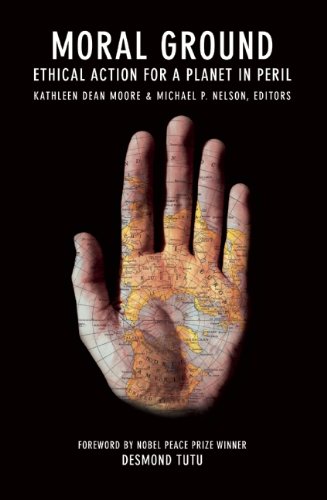Book Review: Kathleen Dean Moore and Michael P. Nelson’s “Moral Ground”
by Miles Raymer
We are living through the most overpopulated, wasteful, and polluted moment in human history. In response to the increasing data and alarm regarding the problem of climate change, many people have begun searching for philosophical and practical frameworks to illuminate how we can reduce our participation in environmental destruction and start healing Earth’s depleted ecosystems. Moral Ground: Ethical Action for a Planet in Peril is a collection of essays offering a wide range of thoughts and emotions about the various ways people and societies can respond to the climate crisis.
To fill out this nearly 500-page volume, editors Kathleen Dean Moore and Michael P. Nelson assembled an all-star cast of more than 80 cultural, scientific, and environmental activists. Although it’s refreshing to encounter so many different personalities and approaches, one of the book’s weaknesses is that by and large the essays are too short to outline more than cursory plans of action (many are a mere 3-4 pages). Moral Ground is long on sentiment and righteous preaching, but short on concrete, comprehensive climate solutions. Still, there are plenty of reasonable, actionable, and even a few delightfully irrational perspectives to be found, even as the “save the world” echo chamber––like our imperiled civilization––feels a bit overcrowded.
Despite each author’s good intentions, I couldn’t help but raise a skeptical eyebrow at many of the essays, especially the ones that presupposed some sort of naturalized divinity or inherent value in the human species. I’m too stupefied by our insignificance on the cosmic scale and too discontented with our slow-motion jabs at efficacious action to take such notions seriously. This view is stated nicely in Robert Michael Pyle’s essay “Evening Falls on the Maladaptive Ape”:
Our moral imperative to turn down the heat is merely our mandate from nature to adapt––to survive. But fat chance we’ve got, now. For this species, and many others we are dragging down with us, it is late in the game…I doubt very much that the culture we know will long persist, absent truly radical changes in the way it works. We are the maladaptive ape, at twilight. Evolution will mock our tardy rage. (128)
Ironically, the majority of these essays deepened my cynicism about whether or not we will muster anything close to the energy and resources necessary for a just transition to a sustainable future. The ideas and actions advocated for in this book––from best to worst––are so antithetical to the currently prevailing economic, corporate, and political trends that oftentimes the only rational conclusion seems to be the one Pyle articulates with such crushing poignancy. I retain some small hope that this outlook is an artifact of personal myopia mingled with a sublimated longing for the anthro-apocalypse, but not much.
I was on the verge of writing this book off as nothing more than a cheerless tour of all the reasons why humanity is totally screwed, but a couple of the final essays revived my personal stake in the book by offering a strangely palatable salve for my growing misanthropy. Michael P. Nelson’s “To a Future Without Hope” helped me realize that much of my frustration about the climate problem is linked to my perceived powerlessness to bring about changes that feel beyond my control. Nelson advocates a turn away from consequence-based climate action in favor of virtue ethics:
Turning our backs on hope might be the best thing we can do at this moment in time…I am calling for us to satisfy our obligation to the future by suggesting that we ignore, or at least greatly downplay, the consequences of our actions. I am suggesting instead that our obligation to the future is most properly satisfied when we act rightly and virtuously, and when our motivation stands stubbornly apart from, not held hostage to, the consequences of our actions. (460-1)
I had to read this passage a few times because it felt so counter-intuitive. Isn’t climate action all about consequences? If we work hard but ultimately fail to bring about the right consequences (i.e. less environmental destruction and more just, sustainable human communities), then it was all for nothing, right? This is true to an extent, but Nelson helped me realize that linking my personal choices to large scale climate outcomes is not only self-defeating, but also paralyzing. Naively hoping for a better future that no single person could actually bring about might be preventing me from taking certain actions that are in accordance with my deepest values and aspirations. Better to doggedly pursue a more virtuous version of myself (one who incorporates active participation in climate justice into his definition of virtue) and not give a shit whether or not the world decides to play along. This kind of self-righteous attitude has its limitations, but also appeals to me as a motivating force in ways that more common arguments about why we should fight to ameliorate climate damage just don’t.
This sentiment was compounded by a passage from Paul Hawken’s “The Most Amazing Challenge”: “Forget that this task of planet-saving is not possible in the time required. Don’t be put off by people who know what is not possible. Do what needs to be done, and check to see if it was impossible only after you are done” (464). This kind of language usually sends me into fits of rage, but I actually think this constitutes a special case in which it makes sense to embrace what is, at least superficially, an irrational notion. Anthropogenic climate change is an unprecedented challenge, and none of us can say with certainty that we know how it will turn out. So why concern myself with any particular outcome? Why not simply seek out and commit myself to doing “what needs to be done,” and to hell with the rest of it? Why not indeed.
Rating: 7/10
